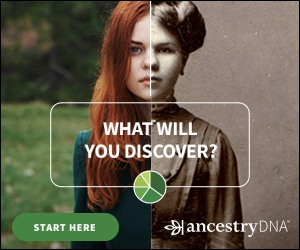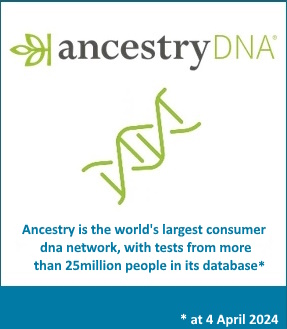- Home ›
- Genealogy & DNA testing
Genealogy & DNA testing
Genetic genealogy
Genealogy dna testing, also known as genetic genealogy, may be able to help you discover more about your ancestral heritage. Some people hail it as the brave new world of genealogical investigation. Others object to it because they say it removes the educational (not to mention, enjoyable) detective work of traditional genealogy research in archives and libraries.

Others insist it's a nonsense designed to separate fools from their wallet.
Probably the majority simply don't know what to think about genealogy dna testing but are curious to know more.
This section of the site is intended to provide information to the latter group. It doesn't pretend to be a learned study of dna testing. It is merely a primer.
It is aimed at the amateur family historian who is curious about what this scientific development might offer his/her research and wants to know what is available and what to consider before deciding whether or not to proceed with a test.
Others insist it's a nonsense designed to separate fools from their wallet.
Probably the majority simply don't know what to think about genealogy dna testing but are curious to know more.
This section of the site is intended to provide information to the latter group. It doesn't pretend to be a learned study of dna testing. It is merely a primer.
It is aimed at the amateur family historian who is curious about what this scientific development might offer his/her research and wants to know what is available and what to consider before deciding whether or not to proceed with a test.
Why bother with genetic genealogy?
If you've already unlocked a fair few generations of your ancestry, dna analysis may seem an unnecessary luxury. Or, depending on your approach to research or your level of curiosity about your genealogy, dna testing may offer just the answer you've been waiting for.
Any of the following reasons might make you consider the cost of genealogy dna testing to be within your budget.
Genetic genealogy is DNA testing that's carried out specifically to learn about a person's heritage.
Genetic genealogy is DNA testing that's carried out specifically to learn about a person's heritage.
- You've hit a brickwall in your paper research.
- You want to see if the genealogical discoveries you've already made stand up to scientific scrutiny.
- You have an unsolved mystery, perhaps about adoptions, rushed marriages or other 'hushed-up' relationships, in your family tree.
- You are satisfied with your knowledge of your more recent heritage (ie during the last few centuries) but you'd like to know about your more distant geographical origin... your ethnic origin.
- You want to find out if you are related to others with the same surname.
Surname studies: dna and genealogy come together
If you've been a family historian for any length of time, it's possible you've been contacted by someone - a stranger - who shares your surname and wonders if you might be related. After a few cursory questions and answers about immediate family and/or a generation or two of ancestors, both parties usually come to the conclusion that they are not related.
But there is a chance (and, with some names, a likelihood) that you and this stranger are indeed related. The problem is that the 'common ancestor' is further back in time than your combined traditional genealogical research can take you.
This is where surname studies come in, because Y-DNA (see below) is passed intact, along with a surname, down the male line.
Surname studies and Y-DNA are, therefore, natural partners in the genealogy dna testing portfolio.
The arrival of autosomal testing
When the well-known dna-testing company FamilyTreeDNA launched its autosomal DNA test (they call it Family Finder) in 2010, genetic genealogy took off big time.
Before long, the genealogy mega-database provider Ancestry jumped into the dna market. The company describes itself as the world's largest consumer DNA network, with the test results of more than 25 million people in its database by April 2024.
Each person tested receives an 'ethnicity estimate' ie they learn what percentage of
Irish, Scandinavian or Native American (etc) heritage might be in their
blood.
Each test is also matched against existing and (on an on-going basis) newly processed test results of other people, and delivers a way of making contact, through Ancestry, with your closest 'matches'... people with whom you share more than 8cM (centimorgans) of dna.
The 'ethnic heritage' feature of autosomal dna testing
has proved very popular, even if some believe it to be a bit of fun
rather than something to be taken too seriously. Similar 'ethnic'
ancestry features have since been introduced by FamilyTreeDNA and other
companies new to genetic genealogy, including Living DNA and MyHeritage. You can find out more about
autosomal tests from these companies:
Before long, the genealogy mega-database provider Ancestry jumped into the dna market, and has since grown into the world's largest consumer DNA network, with the test results of more than 25 million people in its database by April 2024. Each receives an 'ethnicity estimate' ie they learn what percentage of Irish, Scandinavian or Native American (etc) heritage might be in their blood.
Each test in the database is matched against existing and (on an on-going basis) newly processed test results of other people, and delivers a way of making contact, through Ancestry, with your closest matches.
The 'ethnic heritage' feature of autosomal dna testing has proved very popular, even if some believe it to be a bit of fun rather than something to be taken too seriously. Similar 'ethnic' ancestry features have since been introduced by FamilyTreeDNA and MyHeritage.
You can find out more about autosomal tests from these companies:
What more do you want to know about
genealogy dna testing?
Select from the menu below to find out more about how dna and genealogy can help you unravel your heritage and geographical origin.
- Let's look at each of the main (genealogy-focused) types of dna test
- Mitochondrial dna testing analyses the maternal line and 'deep ancestral' origins
- Y-dna ancestry tests (aka paternity dna tests because they follow only the male line) can connect you to other branches of your family
- If you're of Irish heritage (or suspect it), you may have y-dna from Niall of the Nine Hostages
- DNA testing for ancestry: how to order your home DNA tests and kits
Select from the menu below to find out more about how dna and genealogy can help you unravel your heritage and geographical origin.
► A brief look at each of the main (genealogy-focused) types of dna test
► Mitochondrial dna testing analyses the maternal line and 'deep ancestral' origins
► Y-dna ancestry tests (aka paternity dna tests because they follow only the male line) can connect you to other branches of your family
► DNA Surname projects explained If you're of Irish heritage (or suspect it), you may have y-dna from Niall of the Nine Hostages DNA testing for ancestry: how to order your home DNA tests and kits
Myths about Genealogy DNA testing
You've probably read or heard about dna paternity tests in the salacious 'celebrity' pages of the tabloid press, or about dna forensic evidence solving heinous crimes.
Genetic genealogy is altogether milder, and perhaps less specific. For example, genealogy dna testing won't tell you about your family's predisposition to certain medical conditions.
Being still relatively new, there remains a certain amount of misinformation floating about. For example, blood tests are not necessary, nor is giving up a precious lock of hair.
It's all done by mouth swab or spit... quick, no messing and painless.
Genetic dna testing is sometimes seen as an alternative to thorough genealogy research. Let's be clear:
• It isn't a quickie family tree option
• It won't tell you the maiden name of your great grandmother
• It won't tell you the name of the townland in Ireland where your ancestors lived in the 16th century
• It won't tell you that you are related to Cillian Murphy or Ed Sheeran.
Some related issues
Until very recently, none of the commercial firms offering genealogical dna testing was geared up to provide genetic medical information (ie a propensity for certain diseases).
However, 23 and Me, an American company, has long offered consumers genetic health testing as well as genetic genealogy testing. It still does, but it now has more competition. Both MyHeritage and Ancestry have introduced health tests to their genealogical product ranges.
I may be being a dinosaur, but I don't feel comfortable about these tests, so I don't recommend them. I don't criticise them, nor do I suggest they should be avoided. Until I come down more firmly on one side or the other, I'll continue to just ignore them! If you want to find out more about them, google the companies I've mentioned above.
Of course, it's possible that any type of dna test could throw up issues you may not wish to know about. The most frequent detection is of a 'non-paternity event' otherwise known as illegitimacy.
Within surname studies, this can often be pin-pointed to a particular generation.
Clearly, this has the potential to cause upset in a family.



